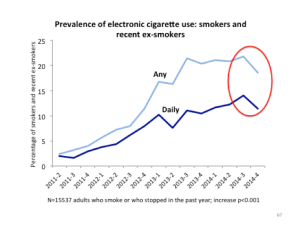The Welsh Health and Social Care Committee gave their report on the new Welsh Bill that will ban vaping in public and enclosed public spaces last week.
We were expecting a yes/no response – yes we agree or no we don’t, i.e. throw the vaping ban out.
What we didn’t expect was a no consensus answer, a ‘no direction’ answer. This means that the Assembly Members are gong to have to work it out for themselves; what they know about e-cigs, what they believe and want to do re banning vaping in public places.
Reading the report for the second time, I had a realisation as to why there was no consensus.
And I’m not 100% convinced it is because of party politics, though I am sure this has played a large part.
Could it be that many of the AMs are simply scared of making the wrong decision?
Reading the first part on e-cigarettes, there were three ‘bodies’ for the ban, 7 against it.
How did the minority that had no evidence have more of an effect than those with evidence?
Could it be that those tasked with regulating are scared of saying yes to e-cigs because of the tobacco industry and the history there? Because of the way that Tobacco Control has so successfully manipulated all our thinking around smoking?
Smokers are portrayed as bad, smelly, lazy, good for nothing people – (sorry Einstein and Churchill). The Tobacco Industry is portrayed as evil, they want to kill you for money and they lie and cheat. Nicotine is supposedly as addictive as heroine and the children are going to become hooked.
Have we all been so brow beaten in to believing this that anything that looks like smoking is evil, that even a product that is at most conservative guess is 95% safer than smoking, but looks a little like it, should be banned because people are scared of history repeating itself?
Only a few regulators will take that risk.
It doesn’t matter that expert witnesses sat in front of the committee, expert witnesses that have spent their entire careers studying tobacco control and who told the committee that banning e-cigarettes in public was a bad idea. The committee couldn’t come to a consensus, couldn’t agree, and as such could not put forward any recommendations.
This is troubling, because we now have regulations that could come into force because of a ‘possibility’. A possibility of harms, not any actual proof, and nor is the credible researching even hinting at this.
What we have is a possibility that at some time in the future there may be harms.
But how long into the future are we looking? The majority of vapers have been smoking for decades, how will we know if any of the harms are due to smoking or vaping or both? Vaping will, if this ban goes through along with the TPD be nothing more than another NRT, one that will no doubt have the same dismal success rates after all the innovation has been regulated out of it.
Non smokers are not interested in vaping, this has been shown again and again, both here and in the USA – but this is still a fear – a ‘potential disbenfit’ that vaping renormalizes smoking. Public Health in Wales believes that it will, in their minds it looks like smoking, so it will encourage smoking. Again the experts outnumbered the generalists, but the fear got in the way of the AMs – it could ‘potentially’ happen.
What of the gateway theory that should have been put to bed a long time ago? Again we have the experts against the generalists – the generalist; all 2 of them plus the Minister based their reasoning on poor, debunked science. The experts, all 4 of them, stated they are not a gateway.
The HSC Committee’s response to this? “ The Committee acknowledges that limited evidence is available about whether the use of e-cigarettes is acting as a gateway to smoking tobacco products. Nevertheless, it is concerned to learn of examples of e-cigarette marketing being targeted at children and young people.”
I could continue, but the rest of the report is in the same vein; the committee acknowledge the lack of evidence to back up the Ministers claims but they remained concerned or want more monitoring.
How is it that the experts have not managed to convince them?
Why is it that to us, the benefits are as clear as the noses on our faces?
Somehow we have ended up dealing with ideology, one that has a Health Minister when responding to the claim that if vaping is lumped in with smoking, then vapers will be put in harms way said, “people are making choices here, and nobody is forced to use an e- cigarette or a conventional cigarette or to stand next to anybody else who is using either”.
You can’t fight that mind-set with facts, or research, because it’s not based on either. It’s based on an emotion, a belief; a belief that smoking is horrible and you shouldn’t do it. It doesn’t matter if that ‘smoking’ is 95% less harmful – you still shouldn’t do it.
And the committee is seems are basing their responses on emotions too, because despite robust positive evidence, given by experts, they remain concerned.
5 AM’s supported the proposed ban, 5 would amend the proposed ban, 4 oppose it. Looking at the numbers there is still a chance that the ban may be defeated and I guess this is a hope we must cling to.
Meanwhile you can still do your bit. You all have your own story, and now would be a great time to tell it. Tell your AM how many you smoked and for how long, tell them how many times you tried and failed to quit using SSS or NRT, but finally vaping helped you.
Make it clear that for you it is a choice between vaping and smoking as everything else has failed, and when you look at it that way; vaping is clearly the better option.







